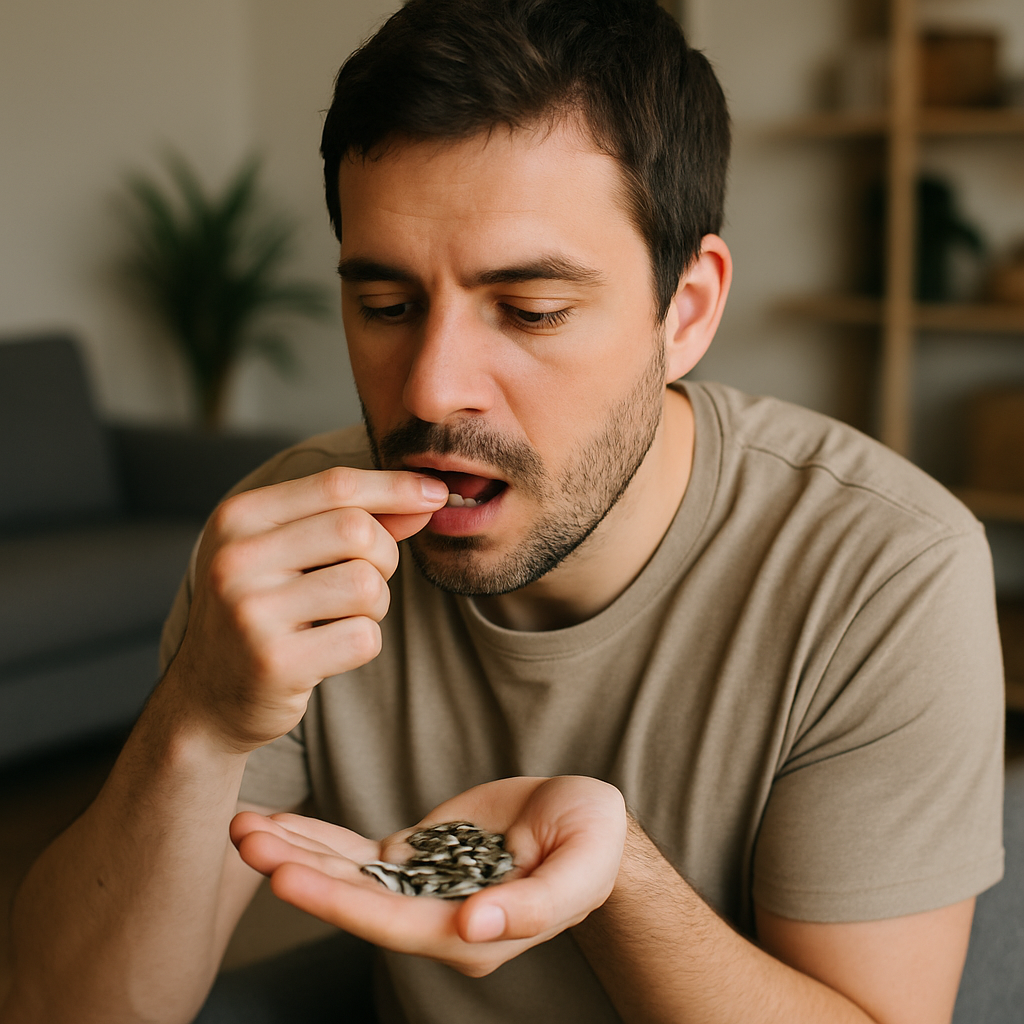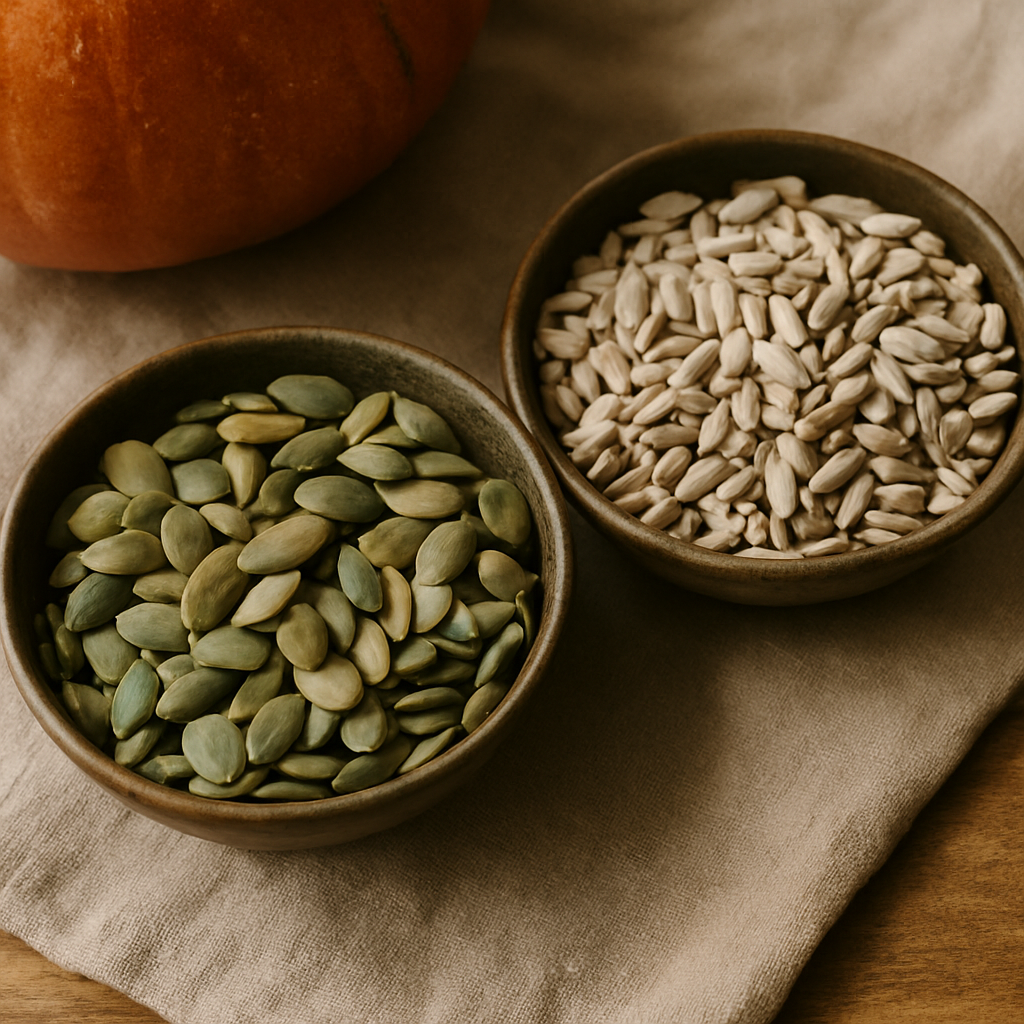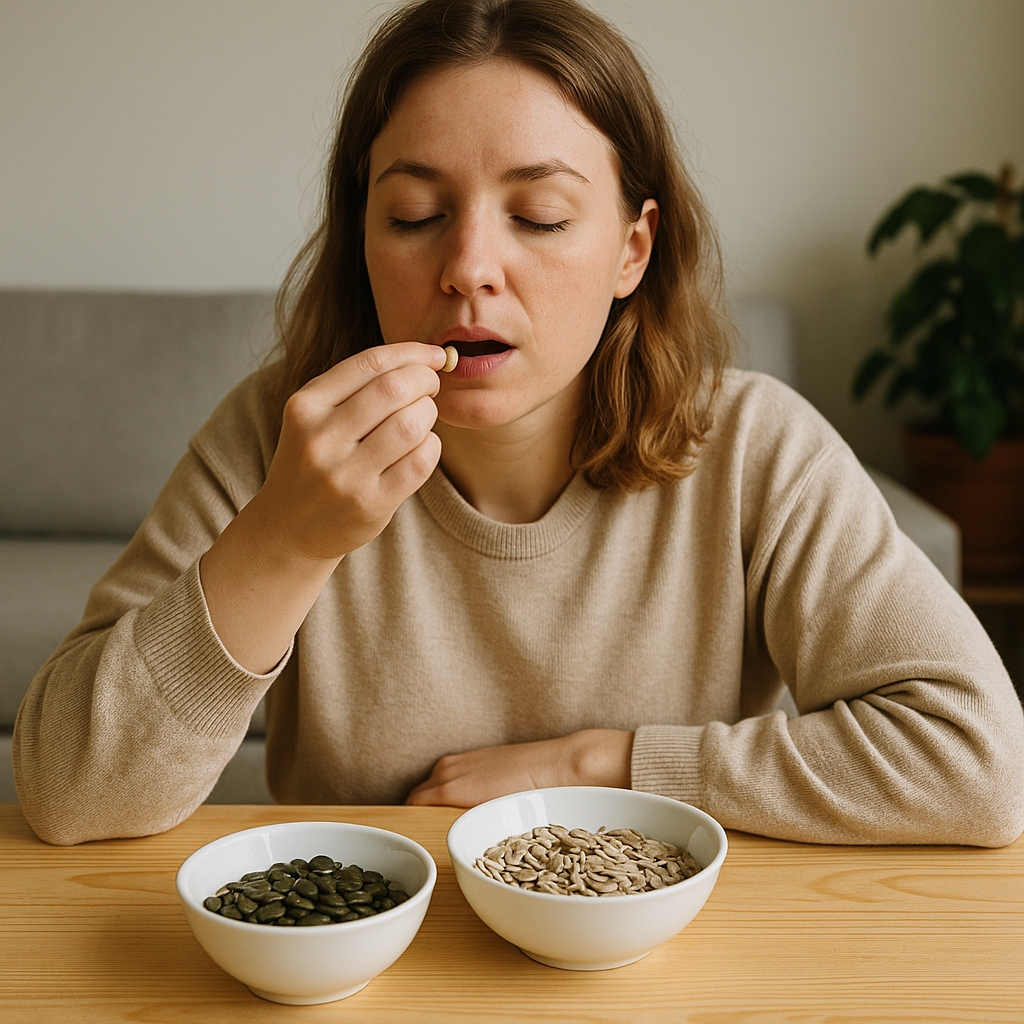कद्दू और सूरजमुखी के बीजों को अधिकतम लाभ के लिए कैसे खाएं

अगर आप सोच रहे हैं कि कद्दू और सूरजमुखी के बीज कैसे खाएं ताकि आपकी सेहत को असली फायदा मिले, तो आप अकेले नहीं हैं। ये छोटे-छोटे बीज बहुत ताकतवर होते हैं, लेकिन इन्हें सही तरीके से खाने से आपको इनसे मिलने वाले फायदों में बड़ा अंतर आ सकता है। चाहे आप कद्दू और सूरजमुखी के बीजों के फायदों के बारे में जानना चाहते हों या इन्हें रोजाना खाने के व्यावहारिक सुझाव चाहते हों, यह गाइड आपको सब कुछ बताएगा — सूरजमुखी और कद्दू के बीज खाने का सबसे अच्छा समय, उनके रचनात्मक उपयोग और यहां तक कि आयुर्वेदिक दृष्टिकोण भी।
सूरजमुखी और कद्दू के बीज स्नैक विकल्प और पोषक तत्व बढ़ाने वाले के रूप में तेजी से लोकप्रिय हो गए हैं। लेकिन कई लोग अभी भी पूछते हैं: क्या आप सूरजमुखी और कद्दू के बीज एक साथ खा सकते हैं? और रोजाना कितने कद्दू और सूरजमुखी के बीज खाना सही है? यह लेख उन सभी सवालों का जवाब देता है, जिससे आप इन पौष्टिक बीजों का अधिकतम लाभ उठा सकें।

क्यों कद्दू और सूरजमुखी के बीज आपके लिए अच्छे हैं
सबसे पहले, आइए बात करते हैं कि कद्दू और सूरजमुखी के बीजों की इतनी तारीफ क्यों होती है। ये बीज मैग्नीशियम, जिंक और स्वस्थ वसा जैसे आवश्यक पोषक तत्वों से भरे होते हैं, जो दिल की सेहत, इम्यूनिटी और यहां तक कि बेहतर नींद में योगदान देते हैं। कद्दू और सूरजमुखी के बीजों के फायदे सिर्फ एक स्वादिष्ट स्नैक होने से कहीं ज्यादा हैं — वे मस्तिष्क के कार्य से लेकर त्वचा की सेहत तक सब कुछ सपोर्ट करते हैं।
कद्दू और सूरजमुखी के बीजों का उपयोग बहुमुखी है, जिससे वे लगभग किसी भी आहार में एकदम फिट बैठते हैं। दोनों बीजों में एंटीऑक्सीडेंट होते हैं जो सूजन को कम करने में मदद करते हैं, साथ ही वे पौधों पर आधारित विकल्पों की तलाश करने वालों के लिए प्रोटीन का एक अच्छा स्रोत प्रदान करते हैं। इतना ही नहीं, ये बीज फाइबर से भरपूर होते हैं, जो पाचन में मदद करते हैं और आपको लंबे समय तक भरा हुआ रखते हैं।
रोजाना कद्दू और सूरजमुखी के बीज कैसे खाएं
रोजाना कद्दू और सूरजमुखी के बीज खाना आपके आहार को पूरक करने का एक शानदार तरीका हो सकता है, लेकिन इन्हें सही तरीके से खाने से आपको अधिकतम लाभ मिलते हैं बिना किसी नुकसान के।
कच्चे, भुने हुए या भिगोए हुए – क्या सबसे अच्छा है?
आप सोच रहे होंगे कि कद्दू और सूरजमुखी के बीज कच्चे, भुने हुए या भिगोए हुए खाने में क्या बेहतर है। खैर, हर विधि के अपने फायदे हैं। कच्चे बीज अपने अधिकांश पोषक तत्वों को बनाए रखते हैं लेकिन कुछ लोगों के लिए पचाने में कठिन हो सकते हैं। भूनने से स्वाद और कुरकुरापन बढ़ता है लेकिन कुछ गर्मी-संवेदनशील विटामिन कम हो सकते हैं। बीजों को भिगोने से फाइटिक एसिड कम हो सकता है, जो खनिज अवशोषण में बाधा डाल सकता है।
तो, कद्दू और सूरजमुखी के बीज खाने का सबसे अच्छा तरीका अक्सर आपकी व्यक्तिगत पसंद और पाचन आराम पर निर्भर करता है। यहां थोड़ा प्रयोग करना बिल्कुल ठीक है!
रोजाना कितने कद्दू और सूरजमुखी के बीज खाएं
जब बात आती है कि रोजाना कितने कद्दू और सूरजमुखी के बीज खाएं, तो संयम महत्वपूर्ण है। विशेषज्ञ आमतौर पर एक छोटी मुट्ठी — लगभग 1 से 2 चम्मच या लगभग 20 से 30 ग्राम — प्रत्येक बीज का प्रतिदिन सेवन करने की सलाह देते हैं। बहुत अधिक खाने से अत्यधिक कैलोरी सेवन या पाचन असुविधा हो सकती है। हिस्से को उचित रखने से आप बिना अधिक किए लाभ उठा सकते हैं।
सूरजमुखी और कद्दू के बीज खाने का सबसे अच्छा समय
सूरजमुखी और कद्दू के बीज खाने का सबसे अच्छा समय क्या है? इसका जवाब एक जैसा नहीं है, लेकिन आमतौर पर इन्हें सुबह या दोपहर के समय अपने आहार में शामिल करना बहुत फायदेमंद हो सकता है। नाश्ते के हिस्से के रूप में या दोपहर के स्नैक के रूप में इन बीजों को खाने से दिन भर आपकी ऊर्जा का स्तर बना रहता है। इनके प्रोटीन और स्वस्थ वसा सामग्री के कारण, वे लंबे समय तक तृप्ति और स्थिर रक्त शर्करा प्रदान करते हैं।
कुछ लोग सोने से पहले कद्दू और सूरजमुखी के बीज खाना भी फायदेमंद पाते हैं, खासकर कद्दू के बीज, जिनमें ट्रिप्टोफैन होता है — सेरोटोनिन और मेलाटोनिन का अग्रदूत, जो बेहतर नींद को बढ़ावा देने वाले हार्मोन हैं। तो, कद्दू के बीजों का एक छोटा सा शाम का स्नैक आपकी नई सोने की आदत हो सकती है!

क्या आप कद्दू और सूरजमुखी के बीज एक साथ खा सकते हैं?
बिल्कुल! क्या आप सूरजमुखी और कद्दू के बीज एक साथ खा सकते हैं? हां, और यह वास्तव में एक शानदार विचार हो सकता है। इन बीजों को मिलाने से उनके पोषक तत्वों की प्रोफाइल अधिकतम हो सकती है क्योंकि प्रत्येक में अद्वितीय विटामिन, खनिज और एंटीऑक्सीडेंट होते हैं।
दोनों को खाने के सहक्रियात्मक लाभ
कद्दू और सूरजमुखी के बीजों को एक साथ खाने से एक ऐसा सहक्रियात्मक प्रभाव पैदा होता है जो उनके हिस्सों के योग से अधिक होता है। कद्दू के बीज मैग्नीशियम और जिंक में उच्च होते हैं, जो इम्यून स्वास्थ्य और मांसपेशियों के कार्य का समर्थन करते हैं। वहीं, सूरजमुखी के बीज विटामिन ई से भरपूर होते हैं, जो आपकी कोशिकाओं को नुकसान से बचाने वाला एंटीऑक्सीडेंट है। साथ में, वे एक संतुलित पोषक तत्व बढ़ावा प्रदान करते हैं जो स्नैकिंग या भोजन में जोड़ने के लिए एकदम सही है।
इन बीजों को मिलाने से आपके स्वस्थ वसा और प्रोटीन के सेवन में भी विविधता आती है, जो आपके समग्र आहार की गुणवत्ता में सुधार कर सकते हैं और भोजन को दिलचस्प बनाए रख सकते हैं।
कौन इस संयोजन से बचना चाहिए?
हालांकि कद्दू और सूरजमुखी के बीज ज्यादातर लोगों के लिए सुरक्षित होते हैं, लेकिन बीजों से एलर्जी या विशिष्ट पाचन स्थितियों वाले लोगों को सावधान रहना चाहिए। कुछ नट या बीज एलर्जी वाले लोग प्रतिक्रियाएं अनुभव कर सकते हैं, और अत्यधिक सेवन से उच्च फाइबर सामग्री के कारण सूजन या असुविधा हो सकती है। यदि संदेह है, तो छोटे मात्रा से शुरू करना और यह देखना सबसे अच्छा है कि आपका शरीर कैसे प्रतिक्रिया करता है।
अपने आहार में कद्दू और सूरजमुखी के बीज शामिल करने के रचनात्मक तरीके
अपने भोजन में कद्दू और सूरजमुखी के बीज जोड़ना उबाऊ या बेस्वाद नहीं होना चाहिए। इन्हें उपयोग करने के कई स्वादिष्ट और रचनात्मक तरीके हैं।
नाश्ते के विचार: स्मूदी, ओटमील और टोस्ट
एक सरल तरीका है कि इन बीजों को अपने सुबह के ओटमील या दही में डालें। वे एक अच्छा क्रंच और पोषक तत्व बढ़ावा देते हैं। आप सूरजमुखी और कद्दू के बीजों को स्मूदी में भी मिला सकते हैं — वे आश्चर्यजनक रूप से अच्छी तरह से मिल जाते हैं और बिना स्वाद को प्रभावित किए एक क्रीमी बनावट बनाते हैं।
टोस्ट प्रेमियों के लिए, उन्हें एवोकाडो या नट बटर स्प्रेड्स पर छिड़कें ताकि अतिरिक्त क्रंच और स्वस्थ वसा की खुराक मिल सके।
बीज मिक्स रेसिपी और स्नैक्स
एक और स्वादिष्ट विकल्प है कि अपने खुद के बीज मिक्स बनाएं, जिसमें भुने हुए कद्दू और सूरजमुखी के बीजों को सूखे फलों और नट्स के साथ मिलाएं। यह मिक्स चलते-फिरते स्नैकिंग के लिए एकदम सही है और बनावट और स्वाद का संतोषजनक संयोजन प्रदान करता है।
आप इन्हें घर के बने ग्रेनोला बार में भी बेक कर सकते हैं या अतिरिक्त पोषण और क्रंच के लिए सलाद और सूप में जोड़ सकते हैं।

आयुर्वेद में कद्दू और सूरजमुखी के बीजों के सेवन पर दृष्टिकोण
आयुर्वेद में, कद्दू और सूरजमुखी के बीजों को न केवल उनके पोषण के लिए बल्कि उनके ऊर्जावान गुणों के लिए भी महत्व दिया जाता है। कद्दू के बीजों को उनकी ग्राउंडिंग और वार्मिंग क्वालिटी के कारण वात और कफ दोषों को संतुलित करने वाला माना जाता है। वहीं, सूरजमुखी के बीज वात और पित्त को शांत कर सकते हैं लेकिन अत्यधिक खाने पर कफ को बढ़ा सकते हैं।
आयुर्वेद में कद्दू और सूरजमुखी के बीजों का उपयोग अक्सर सावधानीपूर्वक संयम और अदरक या दालचीनी जैसे वार्मिंग मसालों के साथ मिलाकर किया जाता है। इन बीजों को भिगोकर या हल्का भूनकर खाना पाचन और अवशोषण को बढ़ाने के लिए पसंद किया जाता है। यह प्राचीन ज्ञान बीजों को भिगोकर एंटी-न्यूट्रिएंट्स को कम करने और पोषक तत्वों की जैव उपलब्धता में सुधार करने पर आधुनिक अंतर्दृष्टि के साथ अच्छी तरह से मेल खाता है।
निष्कर्ष
तो, कद्दू और सूरजमुखी के बीजों को उनके अधिकतम लाभ पाने के लिए कैसे खाएं? जवाब काफी सरल है: एक मामूली दैनिक मात्रा का आनंद लें, अपनी पसंदीदा तैयारी विधि चुनें — कच्चे, भुने हुए या भिगोए हुए — और उन्हें दिन भर अपने भोजन या स्नैक्स में मिलाएं। चाहे एक साथ खाएं या अलग-अलग, कद्दू और सूरजमुखी के बीज कई स्वास्थ्य लाभ प्रदान करते हैं, जैसे कि बेहतर दिल की सेहत से लेकर बेहतर नींद तक।
याद रखें, सूरजमुखी और कद्दू के बीज खाने का सबसे अच्छा समय आपकी व्यक्तिगत दिनचर्या पर निर्भर करता है, लेकिन सुबह और दोपहर के शुरुआती समय ऊर्जा के लिए अच्छे होते हैं, जबकि कद्दू के बीजों का एक छोटा शाम का स्नैक आपको बेहतर नींद में मदद कर सकता है।
अगर आप अपने आहार को मसालेदार बनाना चाहते हैं, तो इन बीजों को स्मूदी, ओटमील या अपने घर के बने बीज मिक्स में जोड़ने की कोशिश करें। और जो पारंपरिक दृष्टिकोण के बारे में जिज्ञासु हैं, उनके लिए आयुर्वेद कद्दू और सूरजमुखी के बीजों को सावधानीपूर्वक उपभोग करने पर मूल्यवान अंतर्दृष्टि प्रदान करता है।
इन पोषक तत्वों से भरपूर बीजों को अपने दैनिक जीवन में शामिल करने की कोशिश करें — आप आश्चर्यचकित हो सकते हैं कि कैसे ऐसी सरल चीजें आपके स्वास्थ्य को बढ़ावा दे सकती हैं और आपके स्वाद को खुश कर सकती हैं!
अक्सर पूछे जाने वाले प्रश्न
क्या मैं बिना भिगोए कद्दू और सूरजमुखी के बीज खा सकता हूं?
हां, आप उन्हें बिना भिगोए खा सकते हैं, लेकिन भिगोने से फाइटिक एसिड कम हो सकता है और पाचन में सुधार हो सकता है। अगर आप उन्हें नहीं भिगोते हैं, तो अपनी पाचन क्षमता के अनुसार भुने या कच्चे संस्करण चुनें।
रोजाना कितने सूरजमुखी और कद्दू के बीज?
एक अच्छा नियम है कि लगभग 1 से 2 चम्मच (20-30 ग्राम) प्रत्येक बीज का प्रतिदिन सेवन करें। यह मात्रा बिना कैलोरी या फाइबर को अधिक किए लाभ प्रदान करती है।
सूरजमुखी और कद्दू के बीज खाने के कोई साइड इफेक्ट हैं?
ज्यादातर लोगों के लिए, ये बीज सुरक्षित होते हैं। हालांकि, बहुत अधिक खाने से पाचन संबंधी परेशानी या संवेदनशील व्यक्तियों में एलर्जी प्रतिक्रियाएं हो सकती हैं। संयम और आपके शरीर की प्रतिक्रिया के प्रति जागरूकता महत्वपूर्ण है।
अगर आपको कद्दू और सूरजमुखी के बीज कैसे खाएं यह जानकर मजा आया, तो इस लेख को अपने दोस्तों और परिवार के साथ साझा करें ताकि वे भी इन साधारण बीजों के कई फायदों को जान सकें। आपका स्वास्थ्य यात्रा बस कुछ बीजों की दूरी पर है!
कोई और प्रश्न हैं?
आयुर्वेदिक डॉक्टर से एक प्रश्न पूछें और मुफ़्त या सशुल्क मोड में अपनी चिंता की समस्या पर ऑनलाइन परामर्श प्राप्त करें।
2,000 से अधिक अनुभवी डॉक्टर हमारी साइट पर काम करते हैं और आपके प्रश्नों की प्रतीक्षा करते हैं और प्रतिदिन उपयोगकर्ताओं को उनकी स्वास्थ्य समस्याओं को हल करने में मदद करते हैं।

